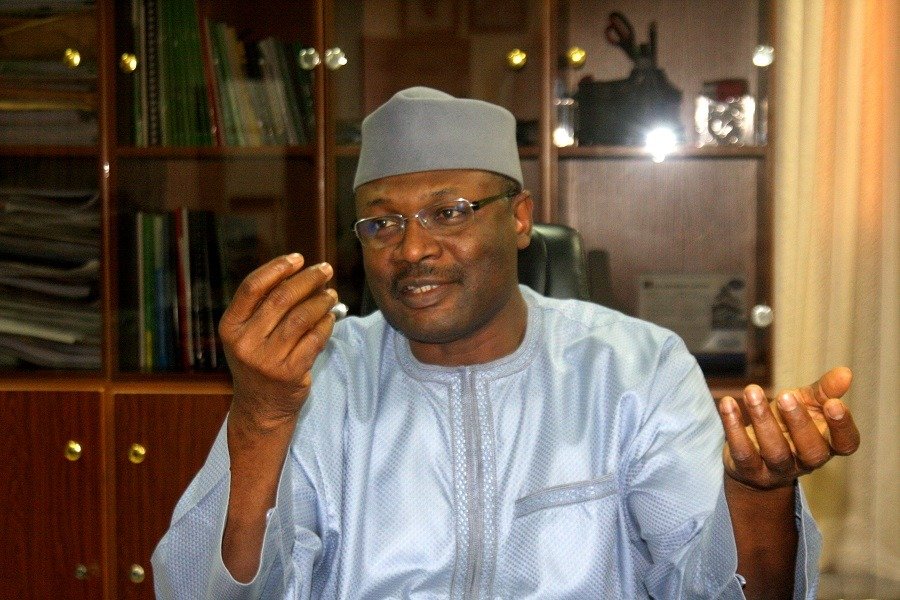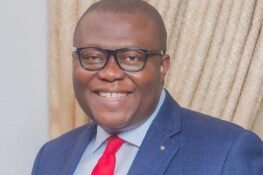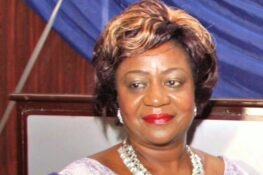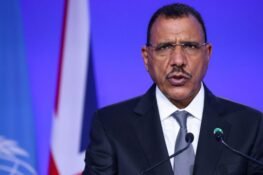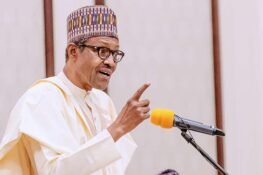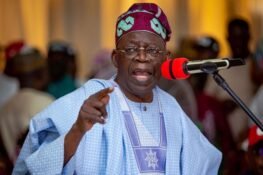You may think it is still two years from the general elections and much too early for politics to gather momentum and you will be wrong.
The electioneering season is actually here.
Camera is rolling and action has started.
Campaigning is not even subtle but it is running on a large scale on social media.
Ahead of others is President Bola Tinubu, whose army of influencers and bloggers are leading the charge to present his 27-month-old administration as the best thing since sliced bread.
WhatsApp is being inundated with stories about what the current administration has achieved in two years – as if we are not living witnesses to the challenges of being a Nigerian.
In one of such stories, President Tinubu claimed to have wiped out corruption in Nigeria. Those who believe that can believe anything.
Our people are falling for the same political tactics that they have consumed detrimentally in the past.
This familiar pattern raises uncomfortable questions about Nigeria’s democratic journey.
For over two decades, Nigerian citizens have watched as promises flow like rivers during campaign seasons, only to dry up once politicians settle into power.
The cycle repeats itself with clockwork precision: grand pledges, electoral victory, policy implementation challenges, public disappointment, and then fresh promises from new candidates.
Understanding this pattern is crucial as we approach 2027.
The Architecture of Unfulfilled Dreams
Since the return to democracy in 1999, each administration has arrived with fanfare and departed amid disappointment.
President Olusegun Obasanjo promised economic reform and anti-corruption measures, establishing the Economic and Financial Crimes Commission (EFCC) and the Independent Corrupt Practices Commission (ICPC).
While these institutions achieved some successes, corruption remained systemic, and poverty levels persisted despite periods of economic growth.
Obasanjo failed to achieve his flagship project of providing steady power supply.
Billions of naira was pumped into the problem but darkness still pervades Nigeria today, several presidents after.
The late President Umaru Yar’Adua campaigned on electoral reform and the rule of law, acknowledging the flawed nature of his own election.
His “Seven Point Agenda” included power sector reform (again), food security, and Niger Delta development.
Though he initiated some meaningful dialogue, his presidency was cut short by illness, leaving many promises unrealized.
Yar’Adua’s successor, President Goodluck Jonathan, promised transformation across multiple sectors.
The “Transformation Agenda” focused on job creation, power generation (yet again), and agricultural development.
While some infrastructure projects were completed and democratic institutions became stronger, unemployment remained high, and the Boko Haram insurgency escalated significantly.
Corruption received fuel while Jonathan was in charge.
He let politicians and their cronies waste public funds with grand impunity.
Under his watch, an estimated $2.2 billion was illegally withdrawn from the Excess Crude Oil Account to finance his re-election campaign, without the knowledge or approval of the National Economic Council.
Then came the turn of former military ruler, President Muhammadu Buhari.
His campaign gave Nigeria bloated hopes of change through his emphasis on three key promises: tackling insecurity, corruption and economic troubles.
With the support of skillful politician, Bola Tinubu, Nigerians were made to believe Buhari was equipped to deliver results.
Buhari campaigned on delivering annual economic growth of about 10 percent annually, but the realities of global oil markets collided with that pledge and his own inabilities.
Like Yar’Adua, Buhari spent much his time receiving medical treatment abroad.
By the end of his tenure, Nigeria had experienced its worst economic recession in decades, while insecurity had spread beyond the Northeast to encompass banditry, which engulfed all parts of Nigeria.
The nation could not wait for Buhari to leave power. When Buhari left, his kingmaker, Bola Tinubu, got his dream job.
The Current Administration’s Early Signals
President Bola Tinubu’s administration typifies how the promise-performance gap perpetuates itself.
During his campaign, Tinubu made promises to “build a Nigeria, especially for our youth, where sufficient jobs with decent wages create a better life” and to “manufacture, create, and invent more of the goods and services we require”.
He promised huge investment in sports entertainment and culture, youth empowerment and entrepreneurship, to expand jobs and opportunities for millions of Nigerian youths.
The removal of fuel subsidies and naira devaluation, while necessary for long-term economic stability, have created immediate hardships that contradict campaign promises of improved living conditions. There has not been a sufficient focus on programs that would alleviate the economic condition of the ordinary citizen.
Nigeria is grappling with its worst cost of living crisis in nearly 30 years. Although the inflation rate has been dropping lately, it is still at 26.5%, according to the IMF.
And the unemployment rate – a campaign promise – stands at 22.6%. While the economy is growing (3% GDP in 2025), it cannot keep pace with needs.
Nigerians are groaning. Yet the political machinery continues churning out success narratives.
This disconnect between official pronouncements and lived reality illustrates why citizens must develop greater skepticism toward political messaging.
The Opposition’s Familiar Playbook
The opposition parties are already positioning themselves with their own set of promises.
The People’s Democratic Party (PDP), Action Democratic Congress (ADC), and Labour Party (LP) are crafting narratives that present them as alternatives to the current administration’s challenges.
However, historical evidence suggests that party affiliation matters less than individual character and competence.
The politicians in the major political parties were all manufactured in the same factory, with no ideological differences.
The PDP governed Nigeria from 1999 to 2015, presiding over significant corruption scandals and governance failures that contributed to their electoral defeat.
The various opposition movements that emerged, including elements now in the Labour Party, have yet to demonstrate concrete governing philosophies beyond criticism of incumbent administrations.
This pattern of changing parties with unchanged convictions suggests that the votes need to reassess their own evaluation criteria for leaders, or they will experience a perpetuation of the same disappointments.
Perhaps, this is the time for Nigerians to take a break from established parties and billionaire candidates.
Breaking the Cycle Through Electoral Sophistication
Nigerian voters must evolve beyond emotional judgment, or ethnic, religious and class considerations, to embrace a more rigorous candidate evaluation process.
First, voters should scrutinize candidates’ track records. What concrete achievements can they point to in the way they managed resources and constraints? What was the result?
Secondly, the credibility of campaign promises matters.
Voters should demand detailed implementation plans, not just aspirational statements.
How will promised jobs be created?
What specific policies will address insecurity?
Where will funding come from for proposed programs?
Thirdly, character assessments, to examine candidates’ responses to challenges, criticism, associates and even foes, is ineluctable.
Do they acknowledge mistakes and learn from them?
Do they surround themselves with competent advisors, or primarily with loyalists?
How do they treat those with less power and means?
Lastly, voters must look beyond established political parties to identify genuine leaders.
Some analysts suggest that a vote for a candidate in a less-known party is a wasted vote.
A vote for an incompetent or untrustworthy candidate in a big party is also a wasted vote, methinks.
The 2027 Imperative
As 2027 approaches, Nigerian voters face a critical choice: continue the cycle of disappointment or demand higher standards from political candidates and themselves.
It may require rejecting candidates who offer only vague promises without implementation details.
It could imply supporting politicians who demonstrate competence over charisma, and substance over affluence.
The responsibility extends beyond individual voting decisions to collective civic engagement. Citizens must organise to scrutinize campaign promises, fact-check political claims, and hold leaders accountable throughout their tenures, not just during election cycles.
Have you considered joining a citizen-led group that aims at empowering ordinary Nigerians to make better political choices? Everyone will need to chip in here and there.
A recent two-day interactive session where ministers and top government officials in the Tinubu administration appeared before stakeholders from Nigeria’s 19 northern states to give accounts of their stewardship before the Ahmadu Bello Memorial Foundation (SAMBF) represent a positive step toward accountability.
Such platforms should be expanded, institutionalized across all regions and spread to the grassroots.
The Power of Informed Choice
The political class will continue their familiar tactics of making promises they do not intend to keep, because it has proven effective.
Change must come from voters who demand evidence over rhetoric, character over connections, and competence over charisma.
The best leaders for Nigeria in 2027 may not emerge from the established political parties that have recycled the same faces and failed policies for decades. The messiah might be found as a diamond in the rough.
As cameras roll and politicians take the stage over the next two years, Nigerian voters must remember that they are not just electing those they may later blame for their economic challenge. The voters can be part of the problem or the solution.
